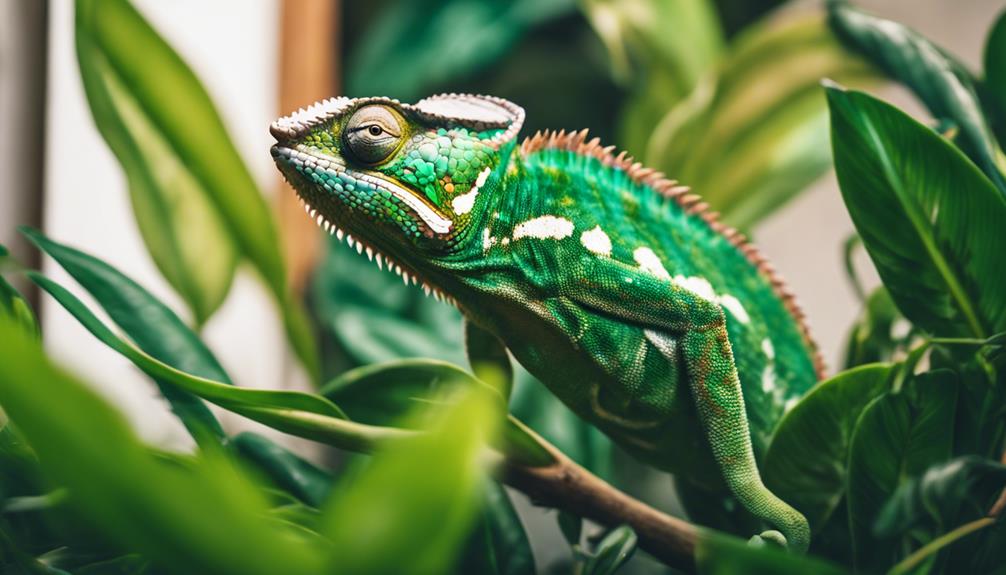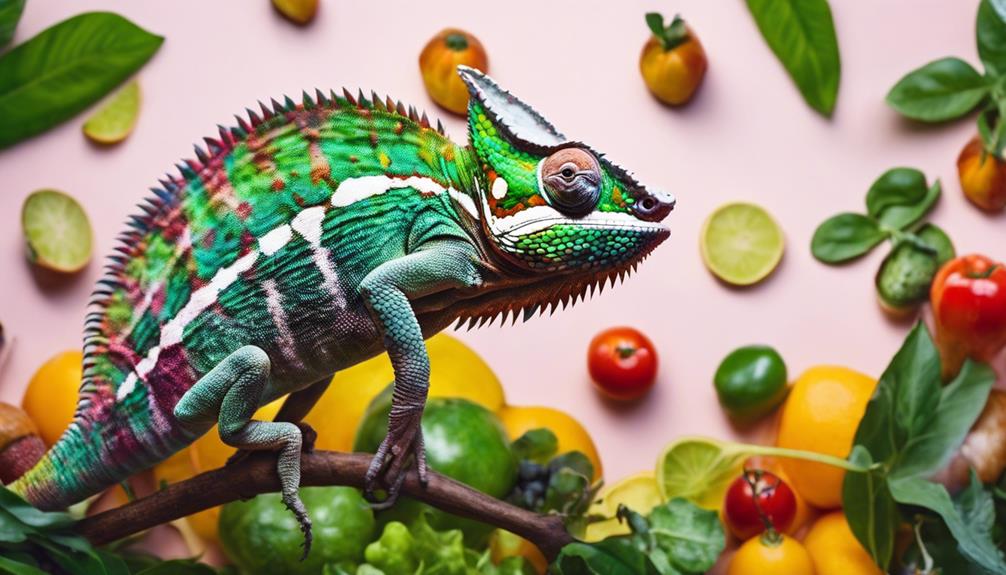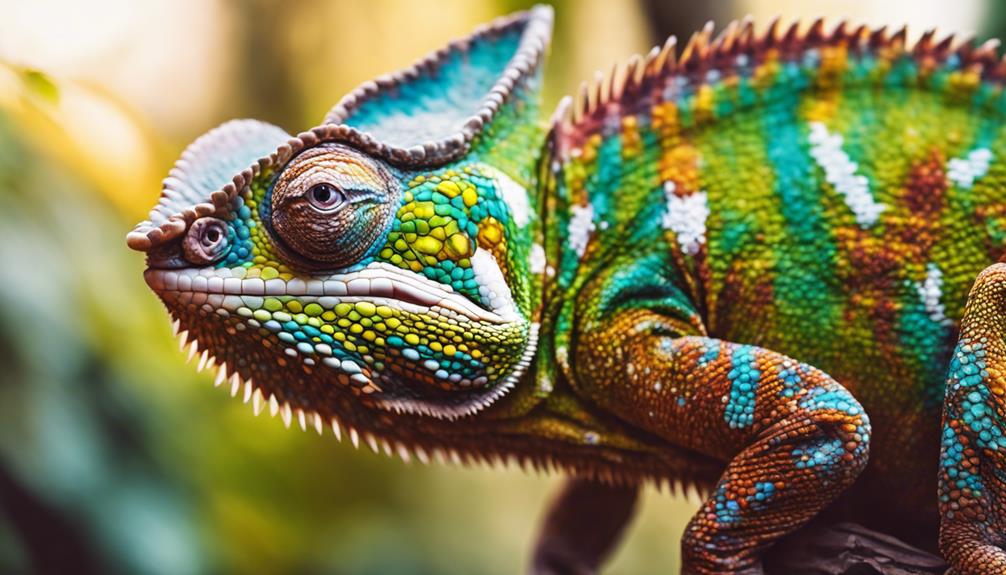You might be wondering if ZZ plants are suitable for your chameleon, but it’s essential to mention that these plants can pose a significant risk due to their toxicity.
While ZZ plants may seem like a stylish addition to your chameleon’s habitat, there are important factors to take into account regarding the safety of your pet.
Let’s explore the potential dangers ZZ plants can pose to your chameleon and discover alternative options that guarantee a healthy and secure environment for your reptile companion.
No, ZZ plants are not safe for chameleons as they contain calcium oxalate crystals which can irritate if touched or ingested. It’s important to choose non-toxic plants for chameleons’ environment.
Potential Toxicity of ZZ Plants
When considering the potential toxicity of ZZ plants for chameleons, immediate symptoms like pain and swelling can arise if ingested. ZZ plants contain calcium oxalate crystals, which are toxic to chameleons and can lead to discomfort and inflammation upon ingestion. This toxicity poses a significant risk to the health of chameleons and other pets if not properly managed. It’s vital to keep ZZ plants out of the reach of chameleons to prevent accidental ingestion and potential harm.
Chameleons may be attracted to ZZ plants due to their lush green appearance, making it essential for pet owners to exercise caution when choosing plants for chameleon habitats. Opting for safe and non-toxic plant alternatives is paramount to guarantee the well-being and safety of these unique pets. By selecting plant species that are harmless to chameleons, you can create a healthy and secure environment for your beloved pets to thrive in.
Effects of ZZ Plants on Chameleons
ZZ Plants can have detrimental effects on chameleons due to their toxic nature, potentially causing immediate harm if ingested. When considering the well-being of your chameleon, it’s important to understand the effects ZZ plants can have on them:
- Toxicity: ZZ plants are poisonous to chameleons, and ingestion can lead to various harmful symptoms.
- Immediate Harm: Consuming ZZ plants can cause immediate adverse effects on your chameleon’s health and well-being.
- Avoidance: It’s recommended to keep chameleons away from ZZ plants to prevent any potential toxicity and guarantee their safety.
- Safe Alternatives: Opting for safe and non-toxic plants like Golden Pothos or Areca Palm in chameleon habitats is essential for promoting a healthy environment for your pet.
Safe Alternatives to ZZ Plants
Considering the toxic effects ZZ plants can have on chameleons, exploring safe alternatives for their habitat is important for guaranteeing their well-being and safety.
Safe plant alternatives include Golden Pothos, Ficus Plants, and Schefflera Trees. These non-toxic options provide chameleons with a suitable environment for thriving. Additionally, chameleons can benefit from the presence of Hibiscus Plants, Grape Ivy, and Areca Palms in their habitat. Rubber Plants, Boston Ferns, and Wandering Jews are also suitable choices that offer safety for chameleons.
Weeping Figs are another excellent option to create an enriching environment for chameleons to explore and interact with. It’s essential to avoid toxic live plants like Zulu Figs, Fiddle-leafed Figs, Creeping Figs, Crotons, and Philodendrons in chameleon enclosures to prevent any harm to these delicate creatures.
Tips for Creating a Chameleon-Friendly Habitat
Looking to create a chameleon-friendly habitat that secures their well-being and comfort? Follow these tips to make sure your chameleon’s habitat is safe and suitable for their needs:
- Incorporate non-toxic plants: Choose plants like Golden Pothos and Boston Ferns to provide a safe environment for your chameleon to thrive without the risk of toxicity.
- Provide climbing structures: Include plants that offer climbing opportunities and edible options to meet your chameleon’s natural behaviors and requirements for physical exercise.
- Create a humid environment: Use plants with water-holding leaves and vine plants such as spider plants to maintain the humidity levels necessary for your chameleon’s health and well-being.
- Ensure appropriate lighting: Install suitable lighting that provides bright light during the day and darkness at night to mimic the natural light cycles your chameleon would experience in the wild.
Conclusion: Are ZZ Plants Safe?
When selecting plants for your chameleon’s habitat, it’s important to prioritize their safety by avoiding ZZ Plants due to their toxic nature when consumed. ZZ Plants can pose a significant risk to chameleons if ingested, potentially leading to immediate symptoms of toxicity. To prevent harm to your chameleon, it’s important to keep ZZ Plants out of their environment. Instead, opt for non-toxic plant alternatives like Golden Pothos or Areca Palm to create a safe and suitable habitat for your pet.
Considering the well-being of your chameleon is paramount, choosing safe plant options is a responsible decision. By selecting non-toxic alternatives such as Golden Pothos or Areca Palm, you can provide a visually appealing environment while ensuring the health and safety of your chameleon. These plant options offer a balance of aesthetics and safety, making them ideal choices for chameleon habitats. Remember, a safe environment is key to promoting the overall welfare of your beloved chameleon.
Frequently Asked Questions
Is the ZZ Plant Poisonous to Chameleons?
When considering chameleon diet and care, be cautious with plant toxicity. Keep reptile safety in mind by avoiding ZZ Plants, known for being pet hazards. Opt for chameleon-friendly Golden Pothos or Boston Ferns for a safe habitat.
What Plants Are Toxic to Chameleons?
When considering plant toxicity for chameleons, it’s important to prioritize their diet. Avoid harmful foliage like Zulu Fig or Crotons. Opt for safe plants like Golden Pothos or Ficus to guarantee chameleon health and pet safety.
What Is the Difference Between ZZ Plant and Chameleon ZZ Plant?
When differentiating between ZZ Plant and Chameleon ZZ Plant, note their growth patterns, soil needs, watering requirements, light preferences, propagation techniques, leaf shapes, care tips, container choices, pest management, and fertilizer suggestions. Each plant offers distinctive characteristics.
Is the ZZ Plant Toxic to Animals?
Avoid ZZ Plants for chameleons. The toxicity poses risks like oral irritation and vomiting. Prevent harm by keeping these plants out of reach. Opt for safe alternatives to prioritize your pet’s health and well-being.
Conclusion
To guarantee the safety of your chameleon, opt for non-toxic plant alternatives like Golden Pothos or Boston Fern in their habitat.
Remember, a little precaution can go a long way in keeping your chameleon healthy and happy.
To sum up, ZZ plants may pose a danger to chameleons due to their toxicity if ingested.
A surprising statistic reveals that ZZ plants are responsible for a significant number of pet poisonings each year.


